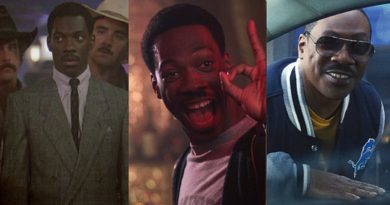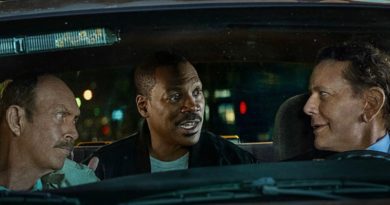Blade Runner 2049 (2017) Review
In this sequel to 1982’s Blade Runner, a young blade runner codenamed K (Ryan Gosling) is assigned to hunt down the old replicants who have overstayed their intended lifespan and “retire” them for good. During his latest mission, he discovers a long-buried secret involving the replicants as well as his own murky past.
When a new Blade Runner movie was announced years ago, my initial reaction was: “Do we really need another one?“. Besides, the 1982 original and the subsequent recuts (particularly the 2007 edition dubbed Blade Runner: The Final Cut) was originally conceived as a one-off movie. The ambiguous ending seen in the first Blade Runner was already good enough and should have left alone. So, why risk tainted the enduring legacy of this sci-fi masterpiece?
But Denis Villeneuve, who took over as director from original helmer Ridley Scott, and his creative team manage to surprise me otherwise. It turns out that Blade Runner 2049 is one of those rare cinematic gems where the sequel not only honours the original but also successfully expand the Blade Runner universe at the same time. Returning screenwriter Hampton Fancher along with franchise newcomer Michael Green (Logan, TV’s American Gods) continues to delve deeper into the meaning of being human, which previously hinted in the first Blade Runner. The depiction of “humanity and identity between mankind and androids (in this case, “replicants”)” angle is definitely nothing new, given the fact it has been explored countless times before in other like-minded movies as well as Japanese animes since the 1982 original.

And yet, Villeneuve and his screenwriting duo able to draw us in with their thoughtful storytelling approach. I also admired the complexity of the storyline that builds one layer after another worthy of meaningful debates, as well as making you ask questions later. Like the 1982 original, Blade Runner 2049 doesn’t spoonfeed you with easy answers. Villeneuve is also good with his sleight-of-hand direction, something that instantly reminds me of Christopher Nolan’s labyrinthine filmmaking style. In case you are wondering why I mention Villeneuve and Nolan in the same sentence, you just have to see it for yourself.
Now, for the visuals and other technical aspects. If you are among the fans who worry whether Villeneuve able to live up Scott’s unforgettable visual depiction of the neon-lit dystopian Los Angeles in the 1982 original, you can now breathe a sigh of relief. The French-Canadian director once again worked with his regular cinematographer Roger Deakins (Prisoners, Sicario) and their third collaboration is undoubtedly the best so far. From the majestic sight of the 2049 Los Angeles to the derelict burnt-orange Nevada desert, every image is visually gorgeous and arresting that demands to be seen on the biggest screen possible. In fact, I would say Deakins’ rich cinematography in this movie is worth the price of admission alone. Besides successfully recreating Scott and the late great Jordan Cronenweth’s mesmerising rain-slicked nighttime cinematography, Deakins even get the chance to visualise the sequel’s dystopian setting in different time and weather conditions including daylight and snow-covered background.

One of the most notable improvements over the 1982 original is the action sequences. Although the word “action” is hardly matters or discussed when comes to a cerebral sci-fi picture like Blade Runner, it still worth mentioning here. As proven in Sicario, Villeneuve continues to impress with his tense action direction in Blade Runner 2049. With the help of veteran second unit director and stunt coordinator Joel Kramer (Total Recall, Terminator 2: Judgment Day and Heat), the action may have been sparse but impactful. Whether it was as simple as K involves in a brief gunfight or a brutal hand-to-hand combat against Niander Wallace’s assistant, Luv (Sylvia Hoeks), the combination of action and sudden burst of violence are all impeccably staged to engaging effect.
Jóhann Jóhannsson, who was originally slated to compose the music for Blade Runner 2049, left the project over creative differences. Fortunately, despite the absence of Villeneuve’s frequent collaborator, Benjamin Wallfisch and Hans Zimmer is a worthy replacement. While Zimmer’s familiar drone-heavy score made a few appearances here, it somehow works well with the bleak tone of Blade Runner 2049. Overall, the music is robust, atmospheric and at times, haunting enough that evokes Vangelis’ eerie score in the original.

As for the cast, Ryan Gosling gives a perfectly stoic performance as the law-abiding K. Gosling’s signature steely expression along with his soulful eyes, in which he put to good use in Nicolas Winding Refn’s Drive and Only God Forgives, complements his brooding character well enough. This is nevertheless one of his best performances to date, while his otherwise weird chemistry with holographic girlfriend Joi (Ana de Armas) is surprisingly affecting. Speaking of Ana de Armas, she proves to be a competent actress after all. Kudos go to Villeneuve for bringing out the best in her, rather than relegating her as a mere eye candy seen in this year’s Overdrive.
Dutch actress Sylvia Hoeks is equally impressive as Luv while Mackenzie Davis’ otherwise minor role as prostitute Mariette delivers a strong support, particularly during a touching three-way romance scene between her, Joi and K. Robin Wright is also a standout here as K’s strict commanding lieutenant Joshi and Dave Bautista brings a superbly restrained quality to his physically-imposing small role as Sapper Morton.

Then, there is Harrison Ford, the original protagonist a.k.a. Deckard in the first Blade Runner. Even though his role is significantly reduced in this sequel, Villeneuve doesn’t simply include him for the sake of fan service. I wouldn’t want to spoil any further regarding his character, but let’s just say his performance does leave a lasting impression.
If there is any flaw in this sequel, Jared Leto’s antagonist role as Niander Wallace lacks the kind of acting prowess to make his Niander Wallace character a memorable villain. Still, such little shortcoming is forgivable that doesn’t stop me to say that Blade Runner 2049 qualifies as one of the best sci-fi sequels of all-time.





